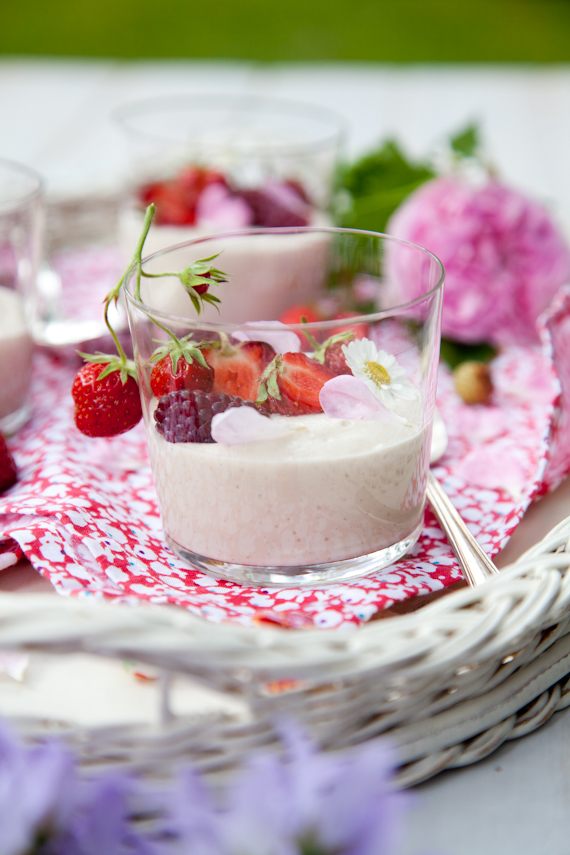
Oh my friends, I miss you so! This journey of sharing the alkaline lifestyle has taken on a whole new look! It’s becoming more than I ever thought or imagined it could be. I am so wishing I could have been here more lately as I really miss this place and all of you! I’ve been playing contractor & designer as I build a wellness and photography studio to do my work which has kept me very busy for months and far far away from the computer…. sigh. My iPhone has become my connection to the world-wide web where I have been taking moments to share via my Instagram or my Facebook feed. If you follow me there you will find micro-blogged posts and recipes until I am settled in my space which won’t be until the fall–eeek! I am sooo excited to get in there and create but the summer has arrived and my young family is ready to play now! I’ll be editing my manuscript in between all the fun and micro blogging until September so be sure to catch me there.
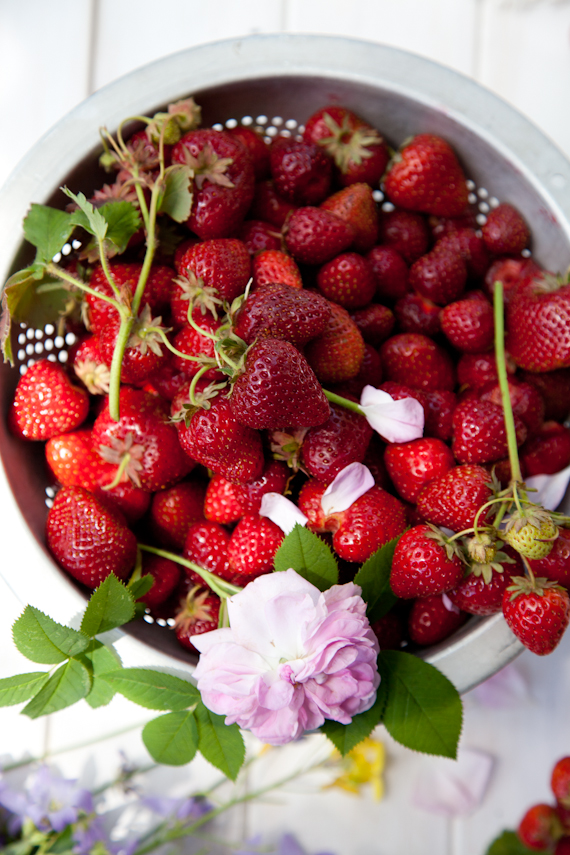
But meanwhile here is a pretty post with a yummy healthy idea for you! I absolutely could not resist pulling out my serious camera and capturing some of the bounty and beauty of the season to share with you. We waited for a warm & sunny bright blue sky to pick berries at a local patch. The kids and I gorged ourselves with juicy deep crimson berries that were warmed by the sun til we couldn’t fit any more in our bellies–creating memories to last us til next summer’s berry picking. You can see here that my precious Amelia is growing like a weed. I’ve asked her to stop growing but she just won’t listen!
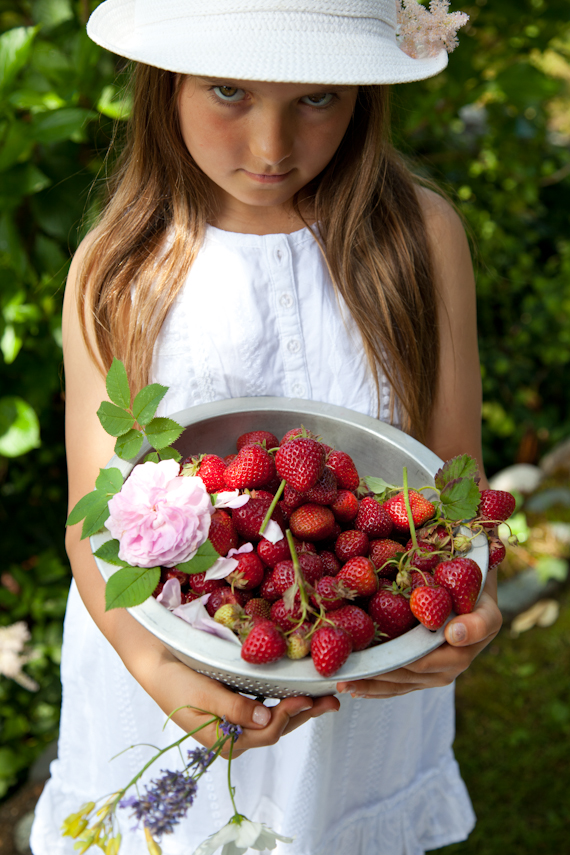
Sooo…..I have a delicious non-fermented young coconut yogurt to recipe for you today. I suppose I can’t truly call it a yogurt if it isn’t fermented but it has a similar consistency and is full of healthy goodness so I feel as tho I can bend the term. I could easily have fermented this creamy mixture but I intentionally chose not to and I never do. Here’s my probiotic/fermented foods perspective.
Call me crazy…. but I just can’t seem to jump on the ‘fermented’ band wagon. No matter how many times I try kombucha or pickled vegetables. I’ll admit that years ago I used to completely embrace dill pickles (I used to can my own), I loved our family’s traditional Norwegian caraway sauerkraut made with sugar and white vinegar and would die for some San Francisco sourdough bread without even a thought. It all used to taste quite yummy to me including that sour taste of fruity yogurts. However, because I have seen the evidence, first hand, of the current epidemic of yeast infested bodies by looking thru a high-powered microscope at many live blood analysis’, I am not sold. Yes there are some ‘good bacteria’ present in fermented foods that can be beneficial for the health of the gut, BUT……they go hand in hand with yeast, fungus and mold floating around in these foods.
Many, many nutritionists and dietitians are recommending that you adopt fermented foods to help improve digestion because they contain probiotics (the good beneficial bacteria), but….. does it mean that it’s the right thing to do every. single. day?? The folks that recommend fermented foods have the best of intentions and are following a theory of thought that can work for some people when they are more in balance, and in moderation of course. But lots everyday? Hmmmm…..Lets explore this for a bit here.
Yeast plays a massive role in the root of almost every disease, showing up in many ways as symptoms of disease. The yeast in fermented foods such as bread, beer, wine, soy sauces, tempeh, vinegar, kombucha, and including nutritional yeast, etc. is no different from that which forms within our body. Yeast is capable of morphing into fungus and/or mold (this is called pleomorphism) which can escalate our symptoms of disease. To go right ahead and feed a yeast overgrowth with more of its own kind is not a good idea, no matter how yummy it might taste. Most people diagnosed with a yeast issue should avoid yeast by adopting an anti-candida diet (95-100% alkaline forming foods) but many people just don’t realize their symptoms of ill-health are related to yeast. Here’s a list of some of the symptoms. The grocery store is stacked with fermented foods and yeast or vinegar laden foods in nearly every single aisle that are a huge part of many people’s every day diet. It’s no wonder that so many folks are plagued with these symptoms and don’t realize it’s a yeast overgrowth they suffer from yet they’ve been told to eat fermented foods for digestive purposes. It can be so darn confusing, can’t it?
A yeast overgrowth begins in the gut as a result of a highly acidic diet as well as from volumes of ingested pathogens as in yeast, fungus and mold especially when there is already an imbalance of the present bacteria populations. This can also result from internal fermentation from poor food combinations like starch and fruit or meat and potatoes. The thing is….in an acidic body, yeast fungus and/or mold will thrive while their acidic waste will make the environment even more acidic all of which is the root of almost every symptom of disease. Until you stop feeding the armies of yeast, fungus and mold with an acidic lifestyle and ingestion of yeast, fungus and mold filled foods, will you be able to get a handle on your symptoms of disease and make progress in your healing. It can cause everything from toe fungus to hair loss. It can be such a nightmare when you experience this and is very difficult to bring back into balance.
This delicate flora of the gut can be balanced by highly alkalizing your body and avoiding poor food combinations, eliminating all sugars and starchy foods and avoiding fermented foods until your symptoms subside. Your gut has the ability to regain balance when you flush the acids and stop feeding the bacteria that thrive on sugars & starches and create acidic waste.
I’m not telling you to never ever eat yeast or fermented foods again but if you have symptoms of disease and are not well, perhaps try eliminating it and see how you feel and if your symptoms begin to lessen. If you are balanced and well with no symptoms, I highly recommend using caution and maybe paying attention to how much you actually consume each day since vinegar lurks in so many products and the kombucha band wagon is tempting.
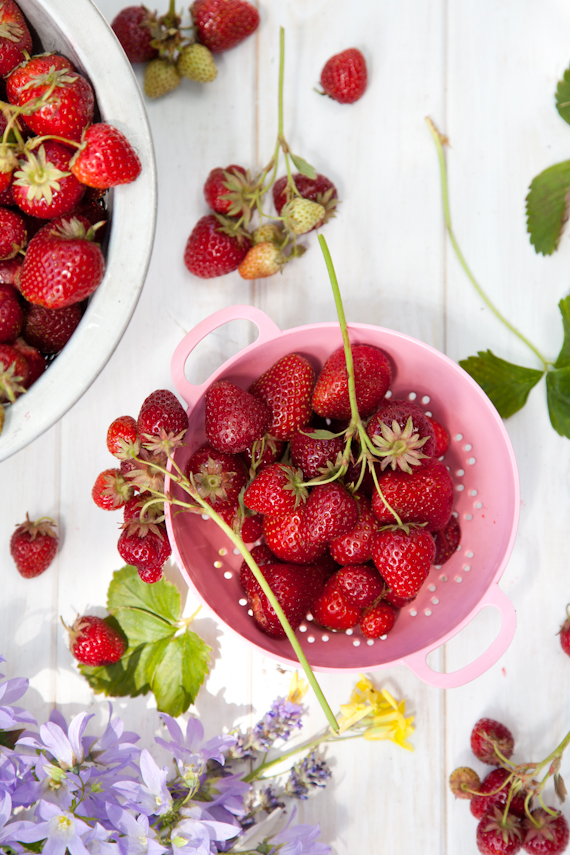
What I have learned about Supplemental Probiotics:
Probiotics are considered to be the good bacteria in the gut that assist in maintaining a healthy flora or environment for optimal digestion. In The pH Miracle -revised version I learned a new perspective on probiotics than what I had learned in nutrition school and from what other health practitioners are sharing world wide. What Dr. Robert O. Young (Author of The pH Miracle) boldly says is this: “There’s no such thing as ‘friendly’ or ‘healthy’ bacteria. Probiotics are transformations of what used to be healthy cells. The presence of bacteria is evidence of an acidic environment. Ideally, the small and large intestine will be clean and free of all microforms. You don’t want to be adding any in there!” What I have come to believe with regards to this perspective is that this would work well when your digestive track is healthy, when you are well and you are eating nearly 100% alkaline foods and you have cleansed well. Ideally, at this point we would not have bacteria in our systems, or very little. However, most of the world’s population is not consuming a diet this pure thus it is difficult to say no altogether to embracing some form of probiotics especially when there is an imbalance of yeast and other unfriendly bacteria in the gut that is very difficult to balance in those that are highly acidic or continue to eat acidic foods as in animal proteins.
Thus my feeling is that using high quality probiotics to correct a huge imbalance is acceptable for short-term or after an antibiotic if you absolutely must have a prescription. They can work effectively to rebuild the gut flora and help to heal your digestive tract. The advantage of using a supplemental Probiotic versus a fermented food with probiotics is that you eliminate the yeast, fungus and mold that are created alongside the bacteria strains.
That said, after doing a 10-14 day purely alkaline veggie feast, using no probiotics whatsoever, it IS possible to dramatically reduce the yeast in your system and then further eliminate it with an 80%+ alkaline diet for a few months. I know this first hand because I have done it! That said, I do see the benefit of pairing Probiotics with a cleanse when the yeast is prolific.
However, using probiotics which are acidic for extended lengths of time can damage the precious digestive cells and villi (hair-like appendages which line the small intestine) where stem cells build blood cells. Your blood production is serious business and you don’t want to mess with this. Yes…. some blood is manufactured within the bone marrow but is a small fraction of what is generated from a healthy digestive tract. Thus it is so very, very important to maintain a healthy digestive tract as it is the basis for optimal wellness.
Please note that many folks will debate this issue of minimizing or avoiding fermented foods and probiotics and what the right choice might be. It’s not my intention with this post (nor in the comments) to engage in a huge debate but to share a perspective that you may not have read that arises from viewing live blood cells and witnessing the micro organisms that are creating havoc in the plasma and damaging the blood cells. It is a unique view-point that many live blood analysis trained microscopists will attest to and have encouraged with clients that has shown to be very effective.
Now why am I writing about all this Probiotic yeast business accompanied by a coconut recipe?? Well, because if you haven’t heard…..coconut oil is a natural Yeast buster. The natural coconut oil in this yogurt contains 3 different fatty acids Caprylic Acid, Capric Acid, Lauric Acid that have each been found to be effective against the Candida yeast. Caprylic acid is particularly a potent anti-fungal and kills the Candida yeast cells by interfering with their cell walls. Capric acid and lauric acid have a similar effect. Unlike other anti-fungals that can lose effectiveness over time, candida yeast is unlikely to build up resistance to coconut oil. So if you want to be proactive against yeast imbalance or you are healing one this non-fermented coconut yogurt is ideal. I haven’t even mentioned the many many other benefits of consuming young coconuts but if you wish to know check the info at the bottom of this post.
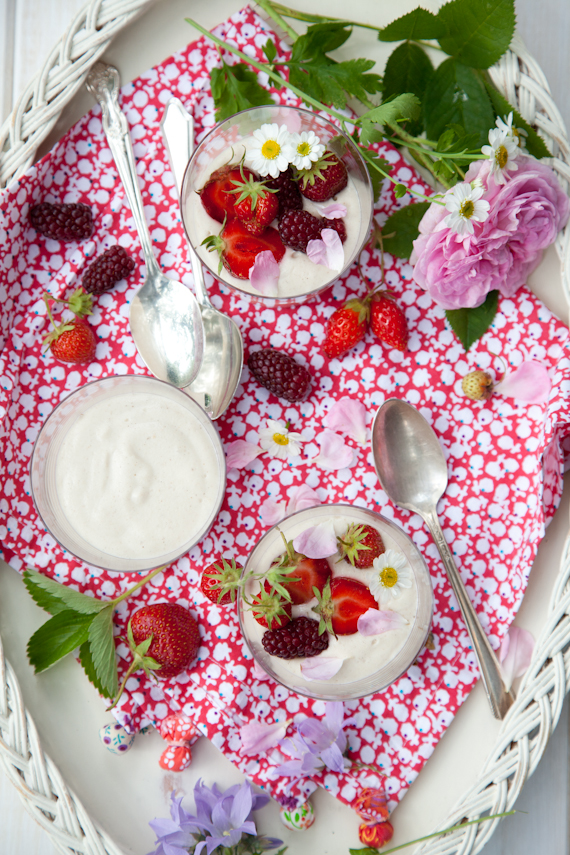
Non-Fermented Vanilla Bean Young Coconut Yogurt with Berries
Yield: approve 1 1/2 cups to 2 cups depending on the yield from the coconuts
2 young coconuts
1/2 scraped vanilla bean pod or 1/2 tsp ground vanilla
1 tsp coconut nectar
3-6 drops stevia, as you may
juice of 1/2 lemon
Method
• Open both coconuts, pour off the water and set aside.
• Scoop the coconut flesh into a small colander, rinse and place in a high-speed blender being careful to inspect for bits of hard shell.
• Add 1/2 of the coconut water to the blender.
• Place remaining ingredients in blender and then blend on very low-speed, and very gradually increasing the speed so as to not toss the mixture high up in the blender. This will result in a creamy mixture free from coconut bits as you pour out of the blender. If it does splash up do your best to scrape it back down with a spatula into the mixture so it can all be creamed nicely. Adjust thickness with additional coconut water if needed. It should be pourable but not runny.
• Pour into serving dishes and top with fresh picked berries.
Notes: – this mixture will set up if chilled as the healthy fats will harden. It’s yummy this way too.
– if the coconut meat is very thick it may require extra of the coconut water. If it is very thin use less than 1/2 of the water. Drink the remaining water if you like, it’s sooo deelish!
-this is also delicious on your chia porridge or with any granola or other fruit you may have. This makes a lovely breakky but equally wonderful dessert!
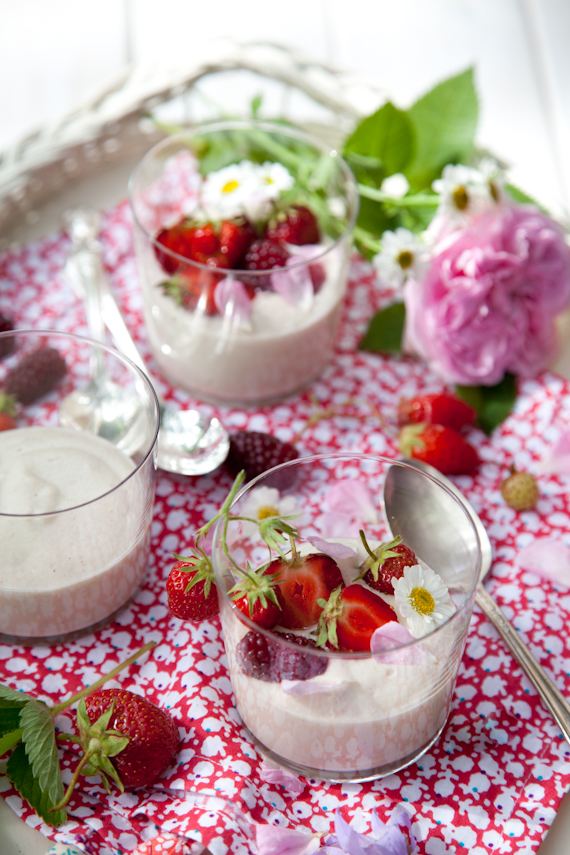
I’m hoping you will give this a try. If it’s the opening of the coconut that might hold you back then check out this dandy tool called the Coco Jack and save 10% with this discount code AlkalizingCoconuts or take a peek at this video that might make it less daunting. Cuz honestly…it’s so worth it for the yumminess and for the amazing health benefits of the young coconut.
I’ll leave you with this intriguing list below. Enjoy the season of warmth and sunshine and the abundance of the harvest. I look forward to being back here again soon, once I get settled in the studio, with some images of what I’ve created! Meanwhile…. I’ll see you on Instagram or Facebook!
A green smoothie cheer to you:)
Top 10 Health Benefits of Coconuts from here
- Supports immune system health: it is anti-viral, anti-bacterial, anti-fungal, and anti-parasite
- Provides a natural source of quick energy and enhances physical and athletic performance
- Improves digestion and absorption of nutrients, vitamins, and minerals
- Improves insulin secretion and symptoms associated with diabetes
- Helps protect the body from cancers due to insulin reduction, removal of free radicals that cause premature aging and degenerative disease
- Reduces risk of heart health and improves good cholesterol (HDL)
- Restores and supports thyroid function
- Helps protect against kidney disease and bladder infection
- Promotes weight loss
- Helps keep hair and skin healthy and youthful looking, prevents wrinkles, sagging skin, age spots, and provides sun protection

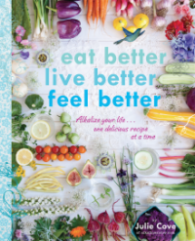
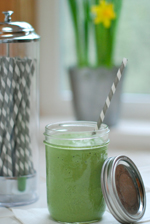 Alkaline Green Smoothie
Alkaline Green Smoothie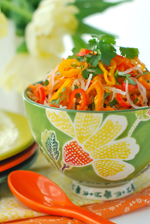 Carrot, Jicama & Sweet Pepper Slaw
Carrot, Jicama & Sweet Pepper Slaw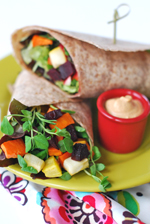 Roasted Root Wrap
Roasted Root Wrap
{ 3 comments }
Love this post! Great information. Also, love that that cute photo! Breakfast time!
Love this website and have used a lot of your recipes and delighted in your enthusiasm and passion for alkaline living. I have transitioned towards an alkaline lifestyle over the past few months at 58yrs. Sadly I had a sudden minor heart attack recently, a stent was inserted and am now recovering and getting back to a better life. I am on medication the Medicos say – for life! There is so much to be thankful for… as I was unaware that I had a blocked heart artery or had suffered a heart attack. Inspite of all of this I intend to stick with the alkaline way of life … However, I am still not losing the weight that I thought I would – I have cut out sugar, no grains or milk and no longer have any cravings… my food intake is so different and start each day with 2-3 glasses warm lemon juice water, green kale, cucumber, celery and spirulina & chia seeds juice with 1 tbsp Udos oil … ongoing vegan mostly so not sure if you have come across this issue before? I also drink approx2-3 litres rainwater daily… alongwith vitamin supplements magnesium, Vit D, Omega 3-6-9, Any clues as to what I might do for weight loss?
What a delicious Yogurt. Feel like having it soon. Anyway, thanks for the post.
Comments on this entry are closed.